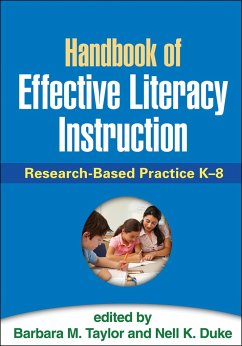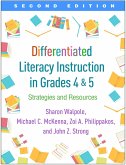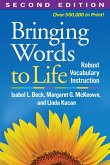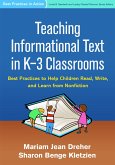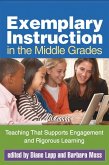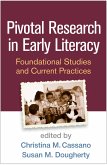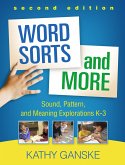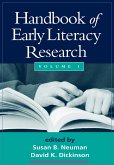Handbook of Effective Literacy Instruction
Research-Based Practice K-8
Herausgeber: Taylor, Barbara M; Duke, Nell K
Handbook of Effective Literacy Instruction
Research-Based Practice K-8
Herausgeber: Taylor, Barbara M; Duke, Nell K
- Broschiertes Buch
- Merkliste
- Auf die Merkliste
- Bewerten Bewerten
- Teilen
- Produkt teilen
- Produkterinnerung
- Produkterinnerung
This highly readable handbook synthesizes the best research on K-8 literacy instruction and distills key implications for classroom practice.
Andere Kunden interessierten sich auch für
![Differentiated Literacy Instruction in Grades 4 and 5 Differentiated Literacy Instruction in Grades 4 and 5]() Sharon Walpole (United States University of Delaware)Differentiated Literacy Instruction in Grades 4 and 551,99 €
Sharon Walpole (United States University of Delaware)Differentiated Literacy Instruction in Grades 4 and 551,99 €![Bringing Words to Life Bringing Words to Life]() Isabel L. BeckBringing Words to Life45,99 €
Isabel L. BeckBringing Words to Life45,99 €![Teaching Informational Text in K-3 Classrooms Teaching Informational Text in K-3 Classrooms]() Mariam Jean Dreher (University of Maryland, College Park, USA)Teaching Informational Text in K-3 Classrooms37,99 €
Mariam Jean Dreher (University of Maryland, College Park, USA)Teaching Informational Text in K-3 Classrooms37,99 €![Exemplary Instruction in the Middle Grades Exemplary Instruction in the Middle Grades]() Exemplary Instruction in the Middle Grades39,99 €
Exemplary Instruction in the Middle Grades39,99 €![Pivotal Research in Early Literacy Pivotal Research in Early Literacy]() Pivotal Research in Early Literacy68,99 €
Pivotal Research in Early Literacy68,99 €![Word Sorts and More Word Sorts and More]() Kathy GanskeWord Sorts and More52,99 €
Kathy GanskeWord Sorts and More52,99 €![Handbook of Early Literacy Research, Volume 1 Handbook of Early Literacy Research, Volume 1]() Handbook of Early Literacy Research, Volume 166,99 €
Handbook of Early Literacy Research, Volume 166,99 €-
-
-
This highly readable handbook synthesizes the best research on K-8 literacy instruction and distills key implications for classroom practice.
Hinweis: Dieser Artikel kann nur an eine deutsche Lieferadresse ausgeliefert werden.
Hinweis: Dieser Artikel kann nur an eine deutsche Lieferadresse ausgeliefert werden.
Produktdetails
- Produktdetails
- Verlag: Guilford Publications
- Seitenzahl: 625
- Erscheinungstermin: 21. Juli 2014
- Englisch
- Abmessung: 250mm x 166mm x 29mm
- Gewicht: 1024g
- ISBN-13: 9781462519248
- ISBN-10: 1462519245
- Artikelnr.: 41122046
- Herstellerkennzeichnung
- Libri GmbH
- Europaallee 1
- 36244 Bad Hersfeld
- gpsr@libri.de
- Verlag: Guilford Publications
- Seitenzahl: 625
- Erscheinungstermin: 21. Juli 2014
- Englisch
- Abmessung: 250mm x 166mm x 29mm
- Gewicht: 1024g
- ISBN-13: 9781462519248
- ISBN-10: 1462519245
- Artikelnr.: 41122046
- Herstellerkennzeichnung
- Libri GmbH
- Europaallee 1
- 36244 Bad Hersfeld
- gpsr@libri.de
Barbara M. Taylor, EdD, is Professor Emerita of Literacy Education at the University of Minnesota, where she is also founder and past director of the Minnesota Center for Reading Research. A member of the Reading Hall of Fame, she is a recipient of the Oscar S. Causey Award from the National Reading Conference (NRC, now the Literacy Research Association) and the Albert J. Harris Award and the Outstanding Teacher Educator Award from the International Reading Association (IRA). Dr. Taylor's research interests include reading comprehension and high-level talk and writing about text, elementary schoolwide reading improvement, early reading intervention, and the elements of effective instruction that contribute to children's success in reading. She has published numerous books, book chapters, and journal articles. Nell K. Duke, EdD, is Professor of Language, Literacy, and Culture and an affiliate of the Combined Program in Education and Psychology at the University of Michigan. She is a recipient of honors including early career awards from the American Educational Research Association and the NRC, the Dina Feitelson Research Award from the IRA, and the Promising Researcher Award from the National Council of Teachers of English. Dr. Duke's research interests include the development of informational reading and writing in young children, comprehension development and instruction in early schooling, and issues of equity in literacy education. She is coauthor or coeditor of several books and has published numerous journal articles.
Introduction
Barbara M. Taylor and Nell K. Duke I. Fundamental Components of Effective Literacy Lessons 1. Motivating Classroom Practices to Support Effective Literacy Instruction
Alysia D. Roehrig
Elizabeth Hammond Brinkerhoff
Erik S. Rawls
and Tim Pressley 2. Literacy Tools Created and Used within Print-Rich Classroom Environments
Misty Sailors
Tracey Kumar
Shannon Blady
and Angeli Willson 3. Grouping Practices
Independent Learning Activities
and Effective Instruction
Barbara M. Taylor 4. Balanced
Differentiated Teaching: Explicit Instruction
Scaffolded Support
and Active Student Responding
Debra S. Peterson 5. Classroom Literacy Assessment: Strategies for Informing Instruction and Monitoring Student Progress
Sheila W. Valencia and Heather Hebard 6. Culturally Responsive Literacy Instruction
Ellen McIntyre and Jennifer Danridge Turner 7. Digital Literacy
Susan Watts Taffe and Laurie B. Bauer II. Effective Teaching and Assessment to Develop Essential Literacy Abilities in Students 8. Automaticity versus Fluency: Developing Essential Literacy Abilities with Print
Susan Dougherty Johnson and Melanie R. Kuhn 9. Today's Comprehension Strategy Instruction: "Not Your Father's Oldsmobile
" Katherine A. Dougherty Stahl 10. Comprehension: High-Level Talk and Writing about Texts
Keli Garas-York
Lynn E. Shanahan
and Janice F. Almasi 11. Vocabulary Instruction
Linda Kucan 12. Effective Writing Instruction in the 21st Century
Gary A. Troia 13. Reading and Writing Specific Genres
Nell K. Duke and Lynne M. Watanabe III. Effective Integration of Literacy with Instruction in Content Areas 14. Integration of Literacy and Science
Gina Cervetti 15. Integration of Literacy and Social Studies
Anne-Lise Halvorsen
Janet Alleman
and Kristy Brugar 16. Integration of Literacy and Mathematics
Ellen Fogelberg
Patti Satz
and Carole Skalinder 17. Integration of Literacy and the Arts: Creating Classrooms That Perform
Douglas Fisher
Nan L. McDonald
and Nancy Frey IV. Essential Collaborations for Effective Schoolwide Literacy Instruction 18. Developing and Implementing a Framework for Ongoing Schoolwide Reading Improvement
Barbara M. Taylor 19. Improving the School Literacy Program: Developing Coherence in Curriculum
Instruction
and Assessments
Catherine M. Weber 20. Improving the School Reading Program: A New Call for Collaboration
Sharon Walpole and Kristina Najera 21. Professional Learning: Professional Learning Communities
Whole-School Meetings
and Cross-School Sharing
Debra S. Peterson 22. Professional Learning with and from a Literacy Coach: A Poem in Two Voices
Misty Sailors
Katie Russell
Heather Augustine
and Kerry Alexander 23. Partnering with Parents
Kathryn Roberts
Barbara M. Taylor and Nell K. Duke I. Fundamental Components of Effective Literacy Lessons 1. Motivating Classroom Practices to Support Effective Literacy Instruction
Alysia D. Roehrig
Elizabeth Hammond Brinkerhoff
Erik S. Rawls
and Tim Pressley 2. Literacy Tools Created and Used within Print-Rich Classroom Environments
Misty Sailors
Tracey Kumar
Shannon Blady
and Angeli Willson 3. Grouping Practices
Independent Learning Activities
and Effective Instruction
Barbara M. Taylor 4. Balanced
Differentiated Teaching: Explicit Instruction
Scaffolded Support
and Active Student Responding
Debra S. Peterson 5. Classroom Literacy Assessment: Strategies for Informing Instruction and Monitoring Student Progress
Sheila W. Valencia and Heather Hebard 6. Culturally Responsive Literacy Instruction
Ellen McIntyre and Jennifer Danridge Turner 7. Digital Literacy
Susan Watts Taffe and Laurie B. Bauer II. Effective Teaching and Assessment to Develop Essential Literacy Abilities in Students 8. Automaticity versus Fluency: Developing Essential Literacy Abilities with Print
Susan Dougherty Johnson and Melanie R. Kuhn 9. Today's Comprehension Strategy Instruction: "Not Your Father's Oldsmobile
" Katherine A. Dougherty Stahl 10. Comprehension: High-Level Talk and Writing about Texts
Keli Garas-York
Lynn E. Shanahan
and Janice F. Almasi 11. Vocabulary Instruction
Linda Kucan 12. Effective Writing Instruction in the 21st Century
Gary A. Troia 13. Reading and Writing Specific Genres
Nell K. Duke and Lynne M. Watanabe III. Effective Integration of Literacy with Instruction in Content Areas 14. Integration of Literacy and Science
Gina Cervetti 15. Integration of Literacy and Social Studies
Anne-Lise Halvorsen
Janet Alleman
and Kristy Brugar 16. Integration of Literacy and Mathematics
Ellen Fogelberg
Patti Satz
and Carole Skalinder 17. Integration of Literacy and the Arts: Creating Classrooms That Perform
Douglas Fisher
Nan L. McDonald
and Nancy Frey IV. Essential Collaborations for Effective Schoolwide Literacy Instruction 18. Developing and Implementing a Framework for Ongoing Schoolwide Reading Improvement
Barbara M. Taylor 19. Improving the School Literacy Program: Developing Coherence in Curriculum
Instruction
and Assessments
Catherine M. Weber 20. Improving the School Reading Program: A New Call for Collaboration
Sharon Walpole and Kristina Najera 21. Professional Learning: Professional Learning Communities
Whole-School Meetings
and Cross-School Sharing
Debra S. Peterson 22. Professional Learning with and from a Literacy Coach: A Poem in Two Voices
Misty Sailors
Katie Russell
Heather Augustine
and Kerry Alexander 23. Partnering with Parents
Kathryn Roberts
Introduction
Barbara M. Taylor and Nell K. Duke I. Fundamental Components of Effective Literacy Lessons 1. Motivating Classroom Practices to Support Effective Literacy Instruction
Alysia D. Roehrig
Elizabeth Hammond Brinkerhoff
Erik S. Rawls
and Tim Pressley 2. Literacy Tools Created and Used within Print-Rich Classroom Environments
Misty Sailors
Tracey Kumar
Shannon Blady
and Angeli Willson 3. Grouping Practices
Independent Learning Activities
and Effective Instruction
Barbara M. Taylor 4. Balanced
Differentiated Teaching: Explicit Instruction
Scaffolded Support
and Active Student Responding
Debra S. Peterson 5. Classroom Literacy Assessment: Strategies for Informing Instruction and Monitoring Student Progress
Sheila W. Valencia and Heather Hebard 6. Culturally Responsive Literacy Instruction
Ellen McIntyre and Jennifer Danridge Turner 7. Digital Literacy
Susan Watts Taffe and Laurie B. Bauer II. Effective Teaching and Assessment to Develop Essential Literacy Abilities in Students 8. Automaticity versus Fluency: Developing Essential Literacy Abilities with Print
Susan Dougherty Johnson and Melanie R. Kuhn 9. Today's Comprehension Strategy Instruction: "Not Your Father's Oldsmobile
" Katherine A. Dougherty Stahl 10. Comprehension: High-Level Talk and Writing about Texts
Keli Garas-York
Lynn E. Shanahan
and Janice F. Almasi 11. Vocabulary Instruction
Linda Kucan 12. Effective Writing Instruction in the 21st Century
Gary A. Troia 13. Reading and Writing Specific Genres
Nell K. Duke and Lynne M. Watanabe III. Effective Integration of Literacy with Instruction in Content Areas 14. Integration of Literacy and Science
Gina Cervetti 15. Integration of Literacy and Social Studies
Anne-Lise Halvorsen
Janet Alleman
and Kristy Brugar 16. Integration of Literacy and Mathematics
Ellen Fogelberg
Patti Satz
and Carole Skalinder 17. Integration of Literacy and the Arts: Creating Classrooms That Perform
Douglas Fisher
Nan L. McDonald
and Nancy Frey IV. Essential Collaborations for Effective Schoolwide Literacy Instruction 18. Developing and Implementing a Framework for Ongoing Schoolwide Reading Improvement
Barbara M. Taylor 19. Improving the School Literacy Program: Developing Coherence in Curriculum
Instruction
and Assessments
Catherine M. Weber 20. Improving the School Reading Program: A New Call for Collaboration
Sharon Walpole and Kristina Najera 21. Professional Learning: Professional Learning Communities
Whole-School Meetings
and Cross-School Sharing
Debra S. Peterson 22. Professional Learning with and from a Literacy Coach: A Poem in Two Voices
Misty Sailors
Katie Russell
Heather Augustine
and Kerry Alexander 23. Partnering with Parents
Kathryn Roberts
Barbara M. Taylor and Nell K. Duke I. Fundamental Components of Effective Literacy Lessons 1. Motivating Classroom Practices to Support Effective Literacy Instruction
Alysia D. Roehrig
Elizabeth Hammond Brinkerhoff
Erik S. Rawls
and Tim Pressley 2. Literacy Tools Created and Used within Print-Rich Classroom Environments
Misty Sailors
Tracey Kumar
Shannon Blady
and Angeli Willson 3. Grouping Practices
Independent Learning Activities
and Effective Instruction
Barbara M. Taylor 4. Balanced
Differentiated Teaching: Explicit Instruction
Scaffolded Support
and Active Student Responding
Debra S. Peterson 5. Classroom Literacy Assessment: Strategies for Informing Instruction and Monitoring Student Progress
Sheila W. Valencia and Heather Hebard 6. Culturally Responsive Literacy Instruction
Ellen McIntyre and Jennifer Danridge Turner 7. Digital Literacy
Susan Watts Taffe and Laurie B. Bauer II. Effective Teaching and Assessment to Develop Essential Literacy Abilities in Students 8. Automaticity versus Fluency: Developing Essential Literacy Abilities with Print
Susan Dougherty Johnson and Melanie R. Kuhn 9. Today's Comprehension Strategy Instruction: "Not Your Father's Oldsmobile
" Katherine A. Dougherty Stahl 10. Comprehension: High-Level Talk and Writing about Texts
Keli Garas-York
Lynn E. Shanahan
and Janice F. Almasi 11. Vocabulary Instruction
Linda Kucan 12. Effective Writing Instruction in the 21st Century
Gary A. Troia 13. Reading and Writing Specific Genres
Nell K. Duke and Lynne M. Watanabe III. Effective Integration of Literacy with Instruction in Content Areas 14. Integration of Literacy and Science
Gina Cervetti 15. Integration of Literacy and Social Studies
Anne-Lise Halvorsen
Janet Alleman
and Kristy Brugar 16. Integration of Literacy and Mathematics
Ellen Fogelberg
Patti Satz
and Carole Skalinder 17. Integration of Literacy and the Arts: Creating Classrooms That Perform
Douglas Fisher
Nan L. McDonald
and Nancy Frey IV. Essential Collaborations for Effective Schoolwide Literacy Instruction 18. Developing and Implementing a Framework for Ongoing Schoolwide Reading Improvement
Barbara M. Taylor 19. Improving the School Literacy Program: Developing Coherence in Curriculum
Instruction
and Assessments
Catherine M. Weber 20. Improving the School Reading Program: A New Call for Collaboration
Sharon Walpole and Kristina Najera 21. Professional Learning: Professional Learning Communities
Whole-School Meetings
and Cross-School Sharing
Debra S. Peterson 22. Professional Learning with and from a Literacy Coach: A Poem in Two Voices
Misty Sailors
Katie Russell
Heather Augustine
and Kerry Alexander 23. Partnering with Parents
Kathryn Roberts

